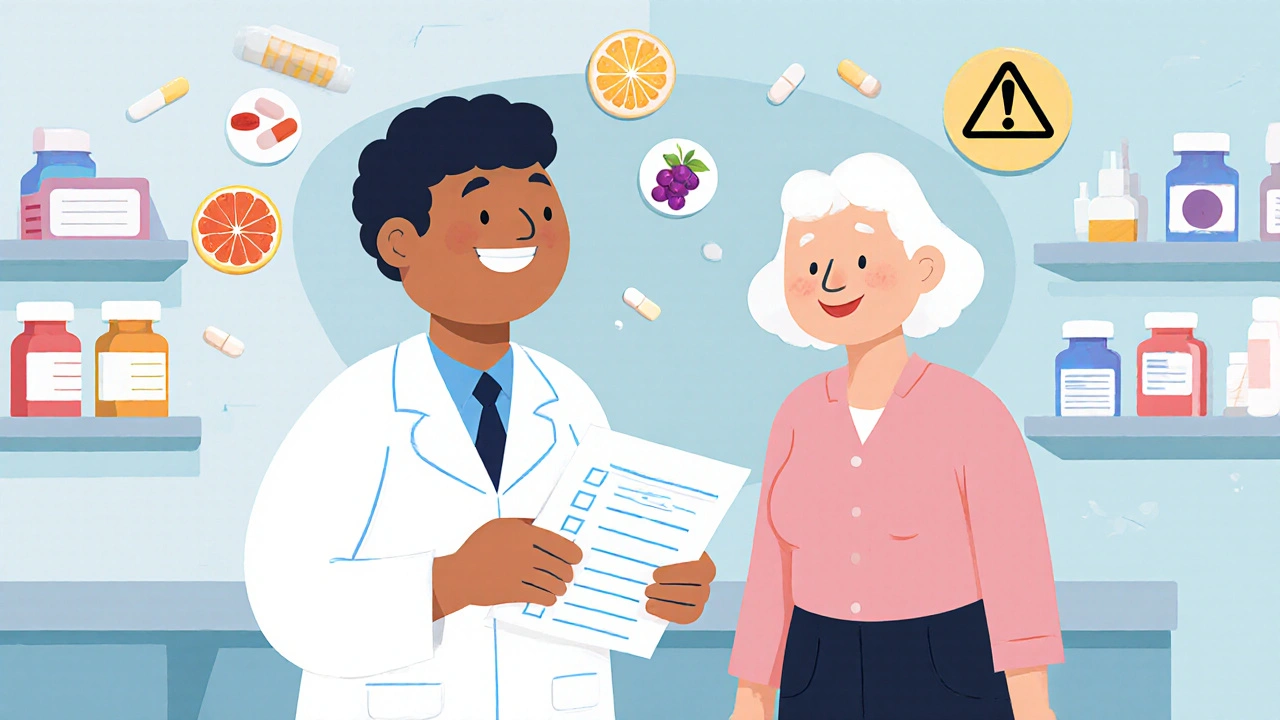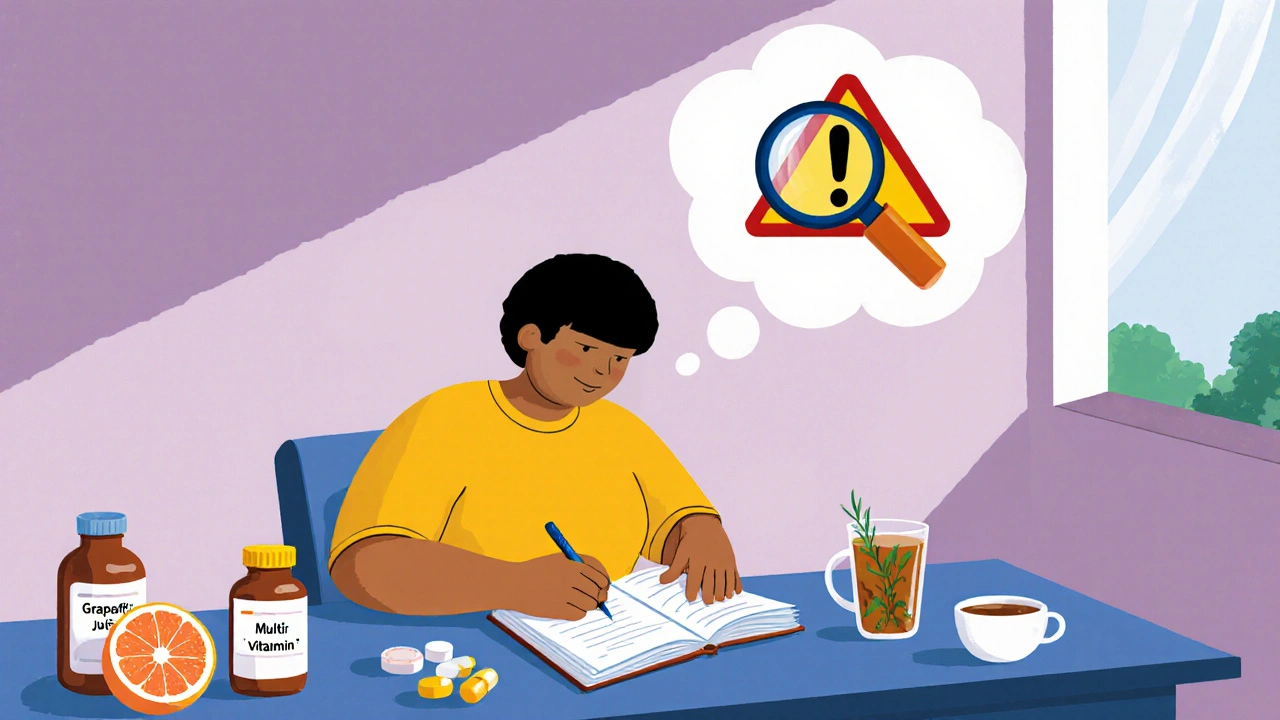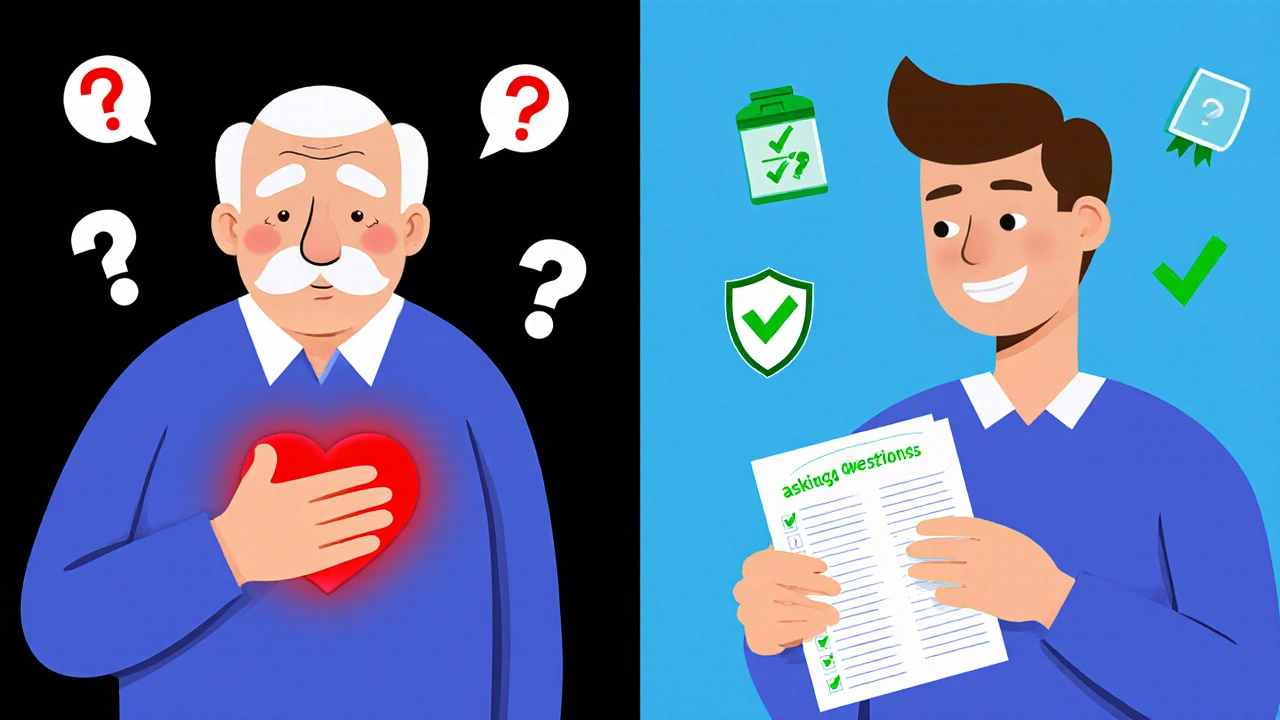How to Ask About Drug Interactions When Getting a New Prescription

Getting a new prescription can feel overwhelming. You’re handed a pill bottle, told when to take it, and sent on your way. But what if that new medicine doesn’t play well with the other pills, supplements, or even foods you’re already using? That’s where drug interactions come in-and they’re more common-and more dangerous-than most people realize.
In the U.S., medication errors linked to drug interactions send over 1.3 million people to the emergency room every year. That’s not a small number. It’s not a rare accident. It’s a systemic risk that happens because too many patients don’t ask the right questions. And the worst part? Most of these interactions are preventable.
What Exactly Is a Drug Interaction?
A drug interaction isn’t just about two pills clashing. It’s when your medication reacts with something else in your body in a way that changes how it works. This could mean:
- One drug makes another less effective
- Two drugs multiply each other’s side effects
- A food or drink blocks your medicine from being absorbed
- A supplement triggers a dangerous reaction
- Your existing health condition makes the drug riskier
For example, if you’re taking warfarin (Coumadin) for blood thinning and then start an antibiotic like ciprofloxacin, your risk of dangerous bleeding can spike. Or if you have high blood pressure and take an over-the-counter decongestant like pseudoephedrine, your pressure could jump to unsafe levels. Even something as simple as grapefruit juice can interfere with statins, making them too strong and increasing muscle damage risk.
The FDA lists over 300 serious drug-drug interactions that require warning labels, and 150 of those can be life-threatening. And that’s just prescriptions. Add in vitamins, herbal supplements, and OTC meds-and the list gets much longer.
Why Pharmacists Are Your Best Line of Defense
Most people assume their doctor checks for interactions. But doctors see dozens of patients a day. They’re focused on diagnosing your condition, not memorizing every possible interaction between 12 different pills.
Pharmacists, on the other hand, are trained specifically to catch these issues. According to the American Pharmacists Association, 92% of pharmacists run full interaction checks before handing out any new prescription. And here’s the kicker: 37% of potentially dangerous interactions are caught by pharmacists before they ever reach you.
That’s why you should treat your pharmacist like your medication safety partner. When you pick up your new prescription, don’t just grab the bottle and leave. Stop. Ask questions. Bring your list. Show them what you’re already taking.
Most pharmacies now use advanced screening software that flags risky combinations in seconds. But even the best software can miss something if you don’t tell them everything. That includes your daily multivitamin, your turmeric capsules, your melatonin for sleep, and even that herbal tea you drink every night.
The 7 Questions You Must Ask
When your doctor or pharmacist gives you a new prescription, don’t wait for them to explain everything. Take control. Ask these seven questions-word for word-every single time.
- Will this interact with my other medications, supplements, or vitamins? This is the most important. Don’t assume they know what you’re taking. List them all-prescriptions, OTC, herbal, even CBD.
- Should I avoid certain foods, drinks, or other products while taking this? Grapefruit juice, alcohol, caffeine, and even high-sodium foods can interfere with common drugs like blood pressure meds and antidepressants.
- What side effects should I watch for, and which ones mean I need to go to the ER? Know the difference between mild nausea and signs of internal bleeding, liver damage, or severe allergic reactions.
- Will this interfere with my current medical conditions? If you have kidney disease, heart failure, diabetes, or glaucoma, some drugs can make those worse. Ask specifically about your conditions.
- Can I take this with my other medications at the same time? Some drugs need to be spaced hours apart. Taking them together can reduce effectiveness or increase side effects.
- Why this drug instead of another one for my condition? There might be safer, cheaper, or better-suited alternatives. Ask if there’s a different option with fewer interaction risks.
- Have you checked for gene-drug interactions? Some people metabolize drugs differently because of their genes. Companies like Genomind offer genetic tests that show how your body handles certain medications. Ask if your pharmacy or doctor uses this kind of testing.
Write these down. Print them. Put them on your phone. Use them every time you get a new script-even if it’s just for antibiotics.

How to Prepare Before Your Appointment
Asking good questions only works if you come prepared. Most medication errors happen because patients forget what they’re taking-or they don’t know the names or doses.
Here’s how to get ready:
- Make a current list of everything you take: prescriptions, over-the-counter pills, vitamins, herbal supplements, and even recreational substances like alcohol or tobacco.
- Include the dose and how often you take each one. Don’t say “I take aspirin.” Say “I take 81 mg aspirin every morning.”
- Bring the actual bottles or pictures of the labels. Packaging has barcodes and exact names that help pharmacists match them to databases.
- Keep one copy at home and one in your wallet or phone. Over two-thirds of medication errors happen because the patient’s list was outdated or incomplete.
- If you use a pill organizer, make sure it’s labeled correctly. A mislabeled compartment can lead to double-dosing or skipping doses.
Don’t be embarrassed to mention alcohol, marijuana, or recreational drugs. Your provider needs to know. These substances can interact dangerously with prescription meds-especially sedatives, painkillers, and antidepressants.
What Happens When You Don’t Ask
The consequences aren’t theoretical. In 2022, the FDA recorded over 12,000 serious adverse events directly tied to drug interactions. Anticoagulants, diabetes drugs, and heart medications were the most common culprits.
One well-documented case involved a 68-year-old man on warfarin who started ciprofloxacin for a urinary infection. He didn’t ask about interactions. Within days, he developed internal bleeding and ended up in the ER. His INR level-a measure of blood thinning-had spiked dangerously high. He survived, but only because he got help in time.
Another example: OTC decongestants like pseudoephedrine caused over 4,200 emergency visits in 2021 alone-mostly in people with undiagnosed or poorly controlled high blood pressure. They didn’t know their cold medicine was raising their pressure to stroke-level risk.
These aren’t rare tragedies. They’re preventable mistakes.

The Future Is Personalized-but You Still Need to Talk
Technology is getting better. Pharmacogenetic testing-where your DNA is analyzed to predict how you’ll respond to drugs-is becoming more common. In 2023, 28% of new drug approvals included genetic interaction data. That’s up from just 5% in 2015.
Some pharmacies now offer software that combines your genetic profile, current meds, and health conditions into one safety report. But here’s the truth: no algorithm replaces a conversation.
The FDA says 83% of serious drug interactions could be avoided with better communication. That’s not because the tech isn’t good enough. It’s because patients don’t speak up.
Even the most advanced system won’t know you started taking ashwagandha for stress, or that you’ve been drinking two glasses of wine every night since your last appointment. Only you can tell them that.
What to Do If Something Feels Off
Even after asking all the right questions, things can still go wrong. If you start feeling dizzy, nauseous, unusually tired, or notice unexplained bruising, bleeding, or skin rashes after starting a new drug-don’t wait.
Call your pharmacist first. They’re trained to triage these situations. If they say it’s serious, go to urgent care or the ER. Don’t assume it’s “just a side effect.” Some side effects are warning signs.
Keep your medication list handy. Show it to whoever treats you. And if you’re unsure whether something’s related to your meds, assume it is until proven otherwise.

8 Comments
Love this post! I’ve been telling my uncle in Delhi to always ask his pharmacist about interactions-he was mixing turmeric with blood pressure meds and didn’t even know it could spike his numbers. Now he carries a little card with his meds list. Simple, but life-saving. Thanks for making this so clear!
As someone who works in clinical pharmacology, I appreciate the granularity here. The 37% interception rate by pharmacists is backed by JAMA data from 2021-most EHRs still don’t integrate OTC/supplement data effectively, so patient self-reporting remains the linchpin. Also, grapefruit-CYP3A4 interactions are still grossly under-communicated in primary care.
Ugh. Another ‘just ask your pharmacist’ feel-good post. You think people don’t know this? They just don’t CARE. I’ve seen patients bring 17 bottles to the counter and still say ‘I don’t take anything else.’ Then they end up in ICU. It’s not the system’s fault-it’s the patient’s laziness and arrogance. 🤦♂️
OMG. I had this happen to my cousin. She took Zoloft + St. John’s Wort + Red Bull. One day she was fine, the next she was screaming in the ER about her heart ‘trying to crawl out of her chest.’ The doctor said it was a serotonin storm. She’s fine now… but her mom cried for three days. And guess what? She didn’t even tell the pharmacist about the herbal tea! 😭 This is why we need mandatory education. Like, in schools. Like, yesterday.
Yes! I used to skip asking questions because I didn’t want to seem ‘difficult.’ But after my mom had a bad reaction to a new antibiotic, I changed. Now I print the list, highlight the meds, and even take a pic of the bottle. My pharmacist knows me by name now-and she gives me extra tips. It’s not scary, it’s empowering. 💪
While the intent of this missive is commendable, its pedagogical efficacy remains fundamentally undermined by its colloquial register and lack of authoritative citation. The assertion that 92% of pharmacists conduct full interaction checks is statistically unsubstantiated in peer-reviewed literature, and the invocation of anecdotal case studies as evidence constitutes a logical fallacy of hasty generalization. One would hope for a more rigorous, evidence-based exposition-perhaps from the NEJM or The Lancet-before disseminating such content to the general public.
Just got a new statin and asked about grapefruit. Pharmacist said ‘avoid it like your ex’s texts.’ 😂 Best advice I’ve ever gotten. Also brought my whole pill organizer-she laughed and said ‘I love people who come prepared.’
Let me be perfectly clear: I am not a doctor, nor am I a pharmacist-but I am a meticulous record-keeper. I maintain a digital log, updated daily, of every substance I ingest-prescription, over-the-counter, herbal, nutritional, recreational, and even dietary supplements-complete with timestamps, dosages, manufacturers, and batch numbers. I present this to every provider, every time. And yes, I have been asked if I’m ‘a spy.’ I replied: ‘No. I’m alive.’